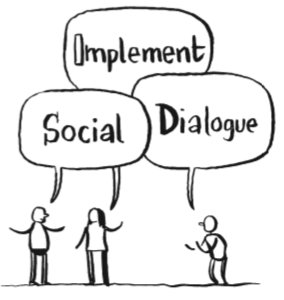A robust Social Dialogue process could drive a sustainable recovery

A robust Social Dialogue process with the broad-based enhancement of capabilities in the economy and society at its core would assist in driving a sustainable recovery from the current crisis that will boost business development, improve wellbeing and invest in the future of citizens and communities.
Government needs to engage all sectors of society, not just trade unions and employers, in addressing the huge challenges Ireland currently faces. Responsibility for shaping the new reality should be shared among all stakeholders. There are many reasons for involving all sectors in this process, including to ensure priority is given to well-being and the common good; to address the challenges of markets and their failures; and to link rights and responsibilities.
When groups have been involved in shaping decisions, they are far more likely to take responsibility for implementing these decisions, difficult as they may be. A process of Social Dialogue involving all and not just some of the sectors in Irish society would be a key mechanism in maximising the resources for moving forward.
After the economic crisis of 2008 ‘social partnership’ was cast as one of the villains of the drama of Ireland’s bubble and bust. However, Social Dialogue in various forms remains common across Europe’s most successful economies and can play a key role in building a fair and sustainable future here in Ireland.
Even prior to the current crisis, Ireland’s economic growth was spread very unevenly. In the absence of some kind of national Social Dialogue, the strongest can fight their corner in the open market or the political realm while the weakest will be left behind. In such a scenario inequality will continue to grow and the integrated development that is required will not be achieved.
Furthermore, there are a range of key issues that go beyond the economy. These include infrastructure (e.g. social housing, public transport, rural broadband); services (e.g. healthcare, education, caring); climate change and sustainability generally; just taxation and good governance. These are all issues that impact on the economy and are impacted on by the economy. Thousands of vulnerable people and households have been further negatively impacted by the current pandemic due to ongoing deficits in these areas. Ireland needs an approach that addresses these issues simultaneously, not one that gives priority to the economy and hopes the benefits will trickle down, which they never do.
A new Social Dialogue could address these issues and build a fairer future. Ireland would greatly benefit from having a structure that would engage all sectors at a national level. Social Dialogue involving all sectors of society would be hugely beneficial. It would help highlight issues at an early stage which would allow them to be addressed promptly. More importantly, it would ensure that the various sectors of society were involved in developing mutually acceptable solutions to problems that emerge which in turn would be most likely to ensure their support for such solutions when implemented by Government.
As already noted, Ireland faces significant challenges in the coming decades, both immediately after the current crisis has passed and further into the future. Among these challenges are the housing and health situations, an increasingly older population, and the transition to a cleaner, greener economy. We need to get beyond growth and markets and recognise that, while they do have a role, they are only part of the solution. It is also important that all sectors and interest groups in society – young and old, urban and rural, businesses, trade unions, farmers, community and voluntary, social inclusion, and environmental – have a voice in deciding how these challenges will be met.
At the core of the new model of Social Dialogue is not the drive towards cost competitiveness (although this is incorporated through the wage bargaining process and productivity improvements) but a broad-based enhancement of capabilities in the economy and society. These do not emerge spontaneously, however, and the role of civil society – where the community and voluntary sector are particularly important in Ireland – is critical here. A credible Social Dialogue process must include the community and voluntary sector and the environmental sector as well as the trade unions, employers and farmers.
A new Social Dialogue along the lines outlined above can re-capture the strengths of earlier periods without their failings. The most competitive and egalitarian economies in Europe operate on this model – supporting the development of their businesses, investing in their populations and protecting their societies. There are many forms that partnership agreements can take. It is time for a conversation about how a different partnership can help a sustainable recovery from this pandemic that will boost business development, improve wellbeing and invest in the future of citizens and communities.

GIVING A VOICE TO THOSE
WHO DON’T HAVE A VOICE
When you support Social Justice Ireland, you are tackling the causes of problems.
